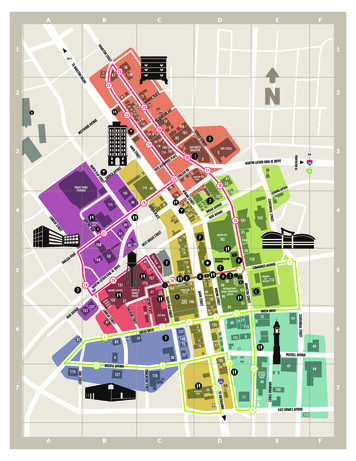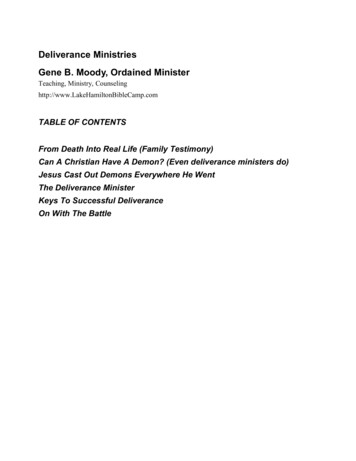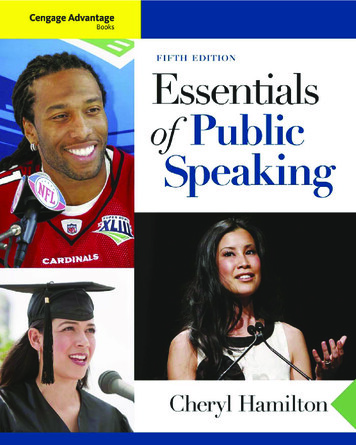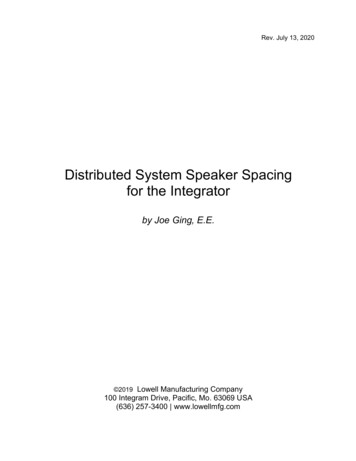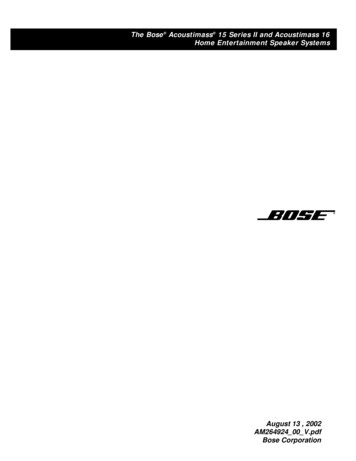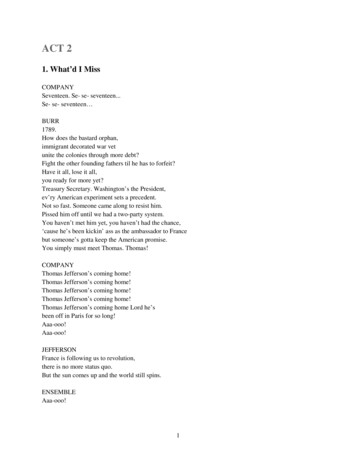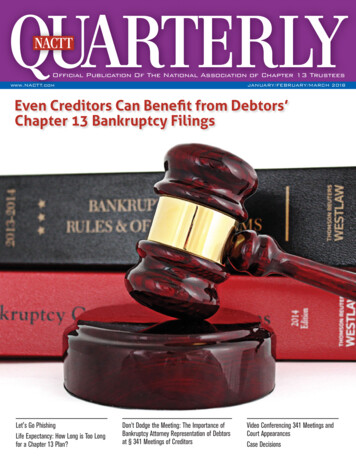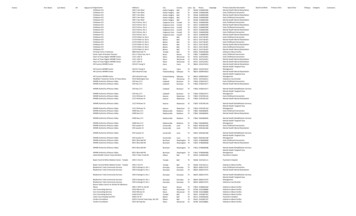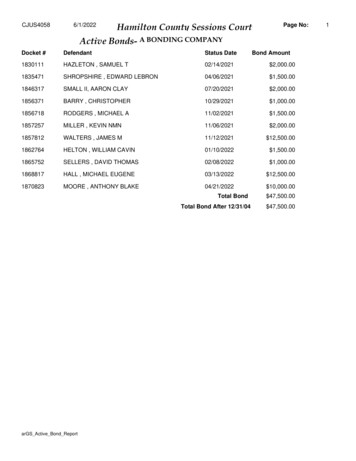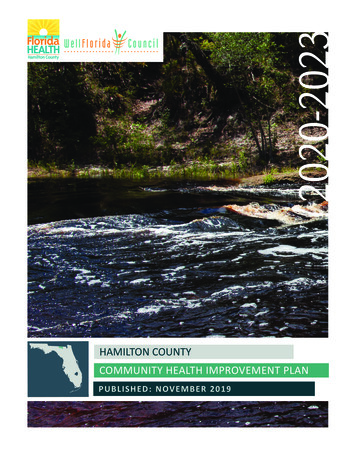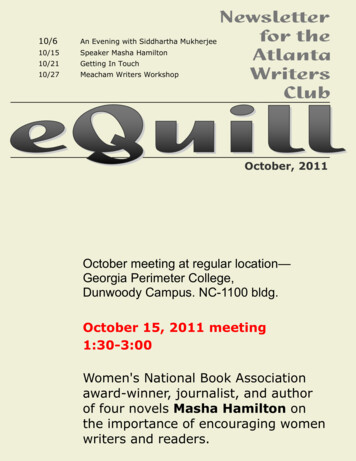
Transcription
10/6An Evening with Siddhartha Mukherjee10/15Speaker Masha Hamilton10/21Getting In Touch10/27Meacham Writers WorkshopOctober, 2011October meeting at regular location—Georgia Perimeter College,Dunwoody Campus. NC-1100 bldg.October 15, 2011 meeting1:30-3:00Women's National Book Associationaward-winner, journalist, and authorof four novels Masha Hamilton onthe importance of encouraging womenwriters and readers.
.founded in 1914We are a social and educational club where local writers meet to discuss thecraft and business of writing. We also sponsor contests for our members andhost expert speakers from the worlds of writing, publishing, and entertainment.Inside this EditionOfficersPresident:Clay RamseyFirst VP:George WeinsteinMembership VP:Ginny CavnahPrograms VP:George WeinsteinSecretary:Bill BlackTreasurer:Kimberly CiamarraOperations VP:Valerie ConnorsContests, Awards,Scholarships VP:Nedra RobertsMarketing/PR VP:Kimberly AllenSocial Director:Cindy WiedenbeckCommunityOutreach VP:Neda GayleeQuill Publisher:Gene BowenVolunteers:Historian/By-Laws:Adrian DrostPhotographer:Jennie HeldermaneQuill Copy Editor:Gene BowenIn Context p.3Scenes from Decatur Book Show p.5Speaker Profile for October p.6An Evening withSiddhartha Mukherjee p.7Chain Gang Elementary p.8Meacham Writers Conferrence p.9UUCA—Getting in Touchwith the Source p.10Scribblers Retreat—NovemberWriter’s Conference p.11Adventures of Obsession p.13Photos of September speaker p.13Screenwriters Weekend p.14AWC Fall Writing Contest p.16Zocalo Submissions p.18Looking Ahead p.19Critique Groups info p.20Membership Information p.22Membership Form p.23Critique Groups:Michael VargaLending /atlwritersclub
Page 3eQuillIn Context, by Clay Ramsey, PresidentIt is a self‐evident truism, a tautology even, that writers write. I have heard this short state‐ment made to those who consider themselves writers as a reminder that they cannot just ap‐propriate this title for themselves without actually writing something regularly. It seems anunnecessary admonition. Using the medium of language, writers craft stories, express the bestof humanity’s hopes and dreams, give voice to our bitterest struggles, shape our profoundestquestions. Writers use words to do this – novelists with hundreds of thousands of them, poetssometimes with just a handful. Either way, it is the production of words that does this: holdinga mirror up to our broken world and creating new ones, opening vistas of experience and clari‐fying our common humanity. If you have ever been paid by the word, you know the connec‐tion that is made between output and income. For many, this represents the economics ofwriting – fill up the page and get paid. This compulsion, driven either by a paycheck or by thepure need for self‐expression, is not a trifling impulse. Writers write. Writers pour forth words,explaining, describing, analyzing, showing (not telling), sharing, inspiring, investigating. Thatmuch is certain.This month, however, I’d like to turn to an aspect of writing that seems counter‐intuitive tothis notion that a writer always and only produces words. I’d like to encourage you, my writer‐friends, to consider the necessity of listening. All good writing, I would argue, starts with thissimple act of listening – listening to the sound the wind makes when it blows through an appleorchard on an autumn day, listening to the conversation between passengers on a city bus,listening to your thoughts before you drift into sleep, listening to the rhythm of good poetry,listening to the honks and shouts and rumbles and screeches on a busy downtown street orthe breezes and chirps and stillness on a country road.Certainly, this is not always easy. Listening is not a simple exercise. There are different skillsinvolved when a musician listens for the perfect tone when a horsehair bow is drawn acrossmetal strings, when a college student listens to a lecture, and when spouses consciously prac‐tice “active listening” to ease a tense situation. It is the same physiological process that hap‐pens: compression waves travel through the ear canal and hit the tympanic membrane, whichsets in motion the delicate mechanism of the middle ear, the creation of an electrical signal inthe inner ear and the arrival of the signal via a complex of nerve cells to the primary auditorycortex in the temporal lobe of the brain. In broad strokes, that’s how we hear sound. But lis‐tening, of course, is different from hearing. An untrained ear can hear a symphony, but only amaster conductor can listen for the exquisite balance between the oboes and the violas or thepitches between the piccolos and the flutes and guide the orchestra to a magnificent perform‐ance. As every student knows, it is one thing to sit in class, allowing the drone of the instructorto be background noise to their daydreaming or texting, and an entirely different learning ex‐perience to understand what is being said, to take complete notes, to formulate incisive ques‐tions, and to fit this new knowledge into an existing intellectual framework. And both men andwomen in relationships have been guilty of mentally disengaging from conversations whilefeigning interest, rather than truly listening.(Continued on page 4)
eQuillPage 4(Continued from page 3)Hearing sounds and recognizing words are far from listening. In these three examples, theskills of listening are related to tone and balance, intellectual engagement and social interac‐tion. But while they seem to occupy different spheres of life, they are all connected by theconcept of meaning. A cardiologist can hear a ‘lub‐dub’ through a stethoscope and identify aheart defect, where others wouldn’t. Listening to sounds, as opposed to just hearing them,requires the skill, training and attention to significant detail that places noise into a meaningfulcontext. A conductor knows what an orchestra should sound like, a diligent student fits a newlesson into previous instruction, and an attentive spouse is able to discern by tone and physi‐cal cues in addition to words that a story about a seemingly minor incident is an attempt tocommunicate something more profound.So what does all this mean for writers? In a word, it means everything. Ernest Hemingwayonce chided F. Scott Fitzgerald in a letter for his failure to do just this, writing, “That’s whatdries a writer up not listening. That’s where it all comes from. Seeing, listening. You see wellenough. But you stop listening.” (1934, in Selected Letters, p. 407). So what did he mean? HadScott gone deaf? Obviously he had not physically lost his sense of hearing, but he had appar‐ently forgotten to exercise his ability to listen. And that failure, according to Hemingway, iswhat leads to professional and artistic failure for a writer. There are stories that circulateabout prolific novelist Joyce Carol Oates. According to the anecdotes, she is an exceptionallydiligent scavenger of conversations – conversations at dinner parties, conversations on thesubway, conversations among academic colleagues. If it is spoken within earshot of her, so thetales go, she will take careful note and it will wind up in some form in one of her many novels.Now, I’m not suggesting that you cannibalize conversations, following friends and familyaround with pad and pencil in hand, literally transcribing every word. If you’re not careful, youcould easily find yourself the defendant in a libel suit. But what I am saying is that the world,even your corner of it that seems so boring, is bursting with material for your work. Have youclosed your eyes during an afternoon shower and tried to translate the sounds of the storminto words? Have you ever heard a snippet of an argument that you thought you might beable to adapt for that troublesome scene in your novel? Are you in the habit of listening to thevast ocean of your own thoughts and putting them on paper? Instead of letting the sounds oflife – language, nature, machinery, music, the whole range of existence – just roll over you,never engaging, never acknowledging, never interpreting, I would encourage you to listen.We live in a noisy world. 24‐hour news cycles, aggressive advertising, traffic and industrialnoise, ever‐present iPod tracks – we are assaulted by sounds, so much so that the phrase“noise pollution” was coined to describe the deleterious effects that excessive noise has onour health. I recognize that if you don’t filter the cacophony of sounds that bombard us tosome degree, then you would probably go mad. But don’t withdraw from sound with artisticpotential. The moment we are able to put this noise in context, giving it meaning, incarnatingit in words of text, that is when we begin to grow as writers. So, my friends, listen. It’s not justsounds; it’s an important key to representing this world in which we live.end
Page 5eQuillScenes from the Decatur Book ShowAWC boothAWC boothJoshilyn JacksonWendy Wax & Karen WhiteJennie Helderman
Page 6eQuillSpeaker Profile for October, 2011 Meetingby Soniah Kamal, Assistant VP of ProgramsMasha Hamilton is the author of four highly acclaimednovels. Staircase of a Thousand Steps (2001) was aBooksense pick by independent booksellers and a Barnes &Noble Discover Great New Writers selection. The DistanceBetween Us (2004) was named one of the best books of theyear by Library Journal. The Camel Bookmobile (2007) wasalso a Booksense pick. Her most recent novel, 31 Hours, wascalled by Publisher's Weekly "gorgeous and complex."Washington Post called 31 Hours one of the best novels of2009 and independent bookstores named an Indie choice.The Post wrote: "Hamilton has used both her considerable empathy as awriter and her experience in the Middle East to create an intimate portrait (She's) made it very hard to tear your gaze away." BookReporter.comfounder Carol Fitzgerald called it "one of the best novels I've read this year."A Brown University graduate, Masha has been awarded fiction fellowshipsfrom Yaddo, Blue Mountain Center, Squaw Valley Community of Writers andthe Arizona Commission on the Arts. She has taught for Gotham WritersWorkshop and the 92nd Street Y in New York City and at a number of writers'workshops around the country. She also taught in Afghanistan at KabulUniversity.On October 15th Masha will give a talk titled Stirring the Pot: Turning YourLife into Fiction. The most compelling stories come directly from the heart,often stemming from personal experiences reshaped and reimagined. Mashawill discuss how and why to move beyond journaling to integrate our ownlives into authentic fiction in all genres.
Page 7eQuillAn Evening with Siddhartha MukherjeeLawrenceville, Ga. – Thursday, October 6th at 7:00pmThe Gwinnett County Public Library is proud to announce its newestGwinnett Reads selection The Emperor of All Maladies by SiddharthaMukherjee. Mr. Mukherjee’s cancer biography has been recognizedas one of the “10 Best Books of 2010” by the New York Times. Thebook chronicles the history of cancer as well as delves into itsorigins, the advancement of diagnoses, and discusses recentdevelopments on this ferocious disease.Mukherjee beautifully weaves compassion for patients and theirfamilies along with the science and research of this complex andcomplicated sickness.This event is free and open to the public. Books will be available forpurchase and signing at the event.Mr. Mukherjee is an Assistant Professor of Medicine as well asCancer Physician at Columbia Medical Center. Mr. Mukherjee hasalso been recognized as one of Time Magazines 2011 “100 MostInfluential People”.For more information, please visit www.gwinnettfallintothearts.orgor call 770.978.5154.AWC member Buzz Bernard's novel EYEWALLhas been selected as a finalist in the EPICeBook Awards suspense/thriller category.Winners will be announced in March 2012.
Page 8eQuillJonathan Grant’s New BookWith its tale of PTA embezzlement and a testingscandal set against a backdrop of immigrationissues and a bitter culture war, the plot of ChainGang Elementary, by AWC member JonathanGrant (Thornbriar Press, 16.00, ISBN 978‐0‐9834921‐0‐8) seems like it’s been lifted straightfrom today’s headlines.Grant began writing the novel when he was a PTA co‐president at a high performingelementary school. In explaining the book’s plot, Grant says, “Chain Gang Elementary is anaccount of a war between parents and administrators at a suburban grade school, withcasualties. And jokes.” How did the book get its title? “It’s the unfortunate nickname MallifordElementary gets after its principal institutes some ‘old‐school’ discipline, enraging parents,” itsauthor states.Chain Gang Elementary officially debuted at the Decatur Book Festival, To learn more aboutthis remarkable book, visit www.chaingangelementary.com. Sample chapters are available fordownload. Check out http://chaingangelementary.com/?p 719 for a Q&A with Grant.Jonathan Grant is an award‐winning writer and editor (The Way It Was in the South: TheBlack Experience in Georgia). He publishes Georgia Colleges (www.georgiacollegesblog.com),a news website covering educational issues. Grant grew up on a Missouri farm and graduatedfrom the University of Georgia with a degree in English. He is a former newspaper journalistand served as a Georgia state government spokesman. He lives in suburban Atlanta with hisfamily and has been PTA president at a five‐star School of Excellence and an elected memberof his local school council.
eQuillPage 9MEACHAM WRITERS’ CONFERENCE RETURNS FOR FALL 2011Offering free readings and workshops twice a year, the biannual conference connects local writerswith award‐winning authors.Chattanooga, Tennessee – Since 1985 the Meacham Writers’ Workshop has been anopportunity for the Chattanooga community to improve their own writing, as well asappreciate the work of nationally and internationally acclaimed authors. Eachconference includes public readings by the visiting authors, as well as workshops,individual conferences, and seminars for local writers to receive feedback andinstruction from the published writers. Held October 27‐29th, all events are free andopen to the public.Visiting writers this conference include New York Times best‐selling author KevinWilson, Bradley Paul, Jane Bradley, Charles Fort, Gaylord Brewer, Mark Cox, William Pitt Root, PamelaUshuck, and Chad Prevost.Readings, which are open to the public, will be held Thursday, October 27 at 7:00 p.m. atChattanooga State, Health Science Center, HSC 1087, as well as a community reading/reception at 9p.m. at the Hart Gallery, located at 110 East Main Street; Friday, October 28 at 12:00 p.m. at UTC,University Center, Raccoon Mountain room, and at 2 p.m. at UTC, University Center, Sequoyah andFortwood Rooms for the Publishing Workshop and Songwriting Workshop, respectively; 7:00 p.m. atUTC, Grote building, room 129; Saturday, October 29 2:00 p.m. at the Chattanooga Theatre Center;and 5:00 p.m. at Winder Binder, located at 40 Frazier Avenue for a participant reading.Participants are to choose between creative writing workshops which will be held on Saturday,October 30 from 10:00 a.m. to 12:00 p.m. at UTC’s University Center or individual conferences whichwill be held Friday and Saturday.All those who submit works for review may indicate their preference for an individual workshop orgroup workshop, and spaces will be assigned according to availability. There are limited spaces forindividual conferences, and organizers will set priorities in filling those slots on a first come firstserved basis.To participate, writers MUST submit their work by October 7th. Up to three poems or up to twelvedouble‐spaced pages of prose can be submitted. Please visit http://meachamwriters.org/submissions.htm to submit online. Online submission is preferred, however, if absolutely necessary,participants may bring three copies each of their work in collated packets to Richard Jackson,Meacham Writers’ Workshop, UTC Engl. Department #2703, 203 Holt Hall. For detailed scheduleinformation and directions to the events please seehttp://www.meachamwriters.org/schedule.htm.
Page 10eQuillrle writea femae toclapAre youaranarns forite.who yeme to w on.ti.writepiratie. insaudienc.notipublicaYou are invited to: Getting in Touch with the SourceA 2-Day Writing Experience for WomenWhat: A one-of-a-kind writing experienceWhen: Friday, October 21 and Saturday October 22ndWhere: Unitarian Universalist Congregation of Atlanta (UUCA)Cost: – Friday night only, Keynote Speaker Pearl Cleage 30.00;2 Day event: 85.00;Saturday at the door: 100Financial Assistance is availableThere are 3 ways to submit your work!1) Submit a piece to be published in the Getting in Touch withthe Source Anthology - Deadline May 30, 20112) Have a one-on-one with a professional editor -Deadline forEditor Review is August 15th, 20113) Perform for an audience at the Coffee House Reading Deadline for Coffee House is August 30, 2011All submitters must be registered for Getting in Touch with the SourceFor registration and submission Information:www.uucawomenwriters.orgTickets available at:UUCA - 1911 Cliff Valley Way, Atlanta 30329Charis Books & More: 1189 Euclid Avenue, NE, Atlanta 30307Phoenix & Dragon Bookstore: 5531 Roswell Road, NE Atlanta, 30342
Page 11eQuillScribblers’ Retreat Writers’ ConferenceNovember 10-12, 2011Hosted by The Lodge at Sea Islandon St. Simons Island, GeorgiaJamie Freveletti,Award winning author chosen by The Estate of Robert Ludlumto write the next in Ludlum's Covert One SeriesLaura DayNew York Times Bestselling Author, “You the expert: Writing about what youknow” Practical Intuition and How to Rule the World from Your CouchMarisa de los SantosNew York Times Bestselling Author, “The Character-Driven Process”Terri GareyAward Winning Author, “The Rise of Urban Fantasy”Roger PinckneyKing of Daufuskie Island, SC, “Getting it right, getting it real”James LoughChair of the Writing Department at Savannah College of Art and Design“Writing Vivid Characters: Details, Dimension, and Drive”(Continued on page 12)
eQuillPage 12Scribblers’ Retreat Writers’ Conference(Continued from page 11)Christine CozzensAgnes Scott College professor directs the Center for Writing and Speaking“Truth and Imagination in the Memoir”Daniel ChapmanStaff Writer for the Atlanta Journal and Constitution since 1999,currently is the writer for business and the economy.Cinque Hicks“The prognosis for arts and book criticism in the 21st century” arts writer andcolumnist for Creative Loafing and the Creative Director of Atlanta Arts NowConference includes: “Meet & Greet Reception” and “Evening with the Author”cocktail reception and live music.Register -996-2904
Page 13eQuillNot the Average Sci‐Fi CreationAWC member Allen R. Gale of Marietta announces the release of his firstnovel, Adventures of Obsession – the Beginning. Not the average Sci‐Ficreation, the book is really an adventure‐romance‐politics‐family storytaking place in our galaxy in the 26th century.Three young people, two from Earth and one from Bandor, sharing a spiritof adventure and a desire to succeed, together go beyond their dreams tobecome a powerful team, bringing out the best in each of them. Theircomplementary skills, sense of duty, compassion for others, and positiveattitudes move them along a path to adventure and success.Along their journey they constantly expand their collectivehorizons, and their number, finding the joy of helping others.They find and share the blessings of friends and family, thesatisfaction of sharing of life, love and everything. Their story isnot a new one, but rather an update on a traditional theme that“the more things change, the more they stay the same”.Whether it is 500 years from now, or 500 years ago, themechanics of life change, but the basic values remain.“The Beginning” is planned to be the first volume of a trilogyabout these interesting young people, following their career andfamily developments as their careers progress.Adventures of Obsession is available in print and Kindleformat from Amazon, and in other ebook formats throughSmashwords. Contact Allen at argale99@gmail.com.September SpeakerIndu Sundaresan, author of theTaj Mahal trilogy and two othernovels set in India, discusseswriting abouthistory, exoticlocations, andintriguingcharacters.
eQuillPage 14Screenwriting Weekend with Steven ArvanitesAward-winning screenwriter and founder of NYCscreenwriter.org, Steven Arvanites will becoming to the Atlanta Writers Club on February 24-25 to critique screenplay submissionsand provide a full day of workshops on the art and business of screenwriting.SCHEDULE:Friday, February 24:Steven Arvanites holds eight one-on-one critique sessions (15 minutes each) withregistrants at his hotel in Dunwoody in the evening.Saturday, February 25:Events to be held at Georgia Perimeter College in Dunwoody10:00-12:00 Writing a High-Concept Screenplay workshop. A high-concept script canbe defined as an original concept with mass-market appeal that can be sold via a pitch.This seminar will outline the three "must-haves" needed for a viable high-concept script,including the all-important "hook.” Q&A will follow the presentation, and Steven Arvaniteswill lead participants through a “verbal worksheet” to outline the must-haves in their ownwork.12:00-1:30 Lunch, and Steven Arvanites will do the final four critiques with individualregistrants (15 minutes each).1:30-3:30 Achieving Your Screenwriting Goals workshop. Setting goals is always thebest way to achieve ucce . In this Writing Goals Workshop, Steven Arvanites willpresent a three-part seminar. In the first part, he will present three steps to achievingsuccess: action, accountability, and achievement. When writers master these three theycan put their professional screenwriting goals in focus and move forward. In the secondpart, he will discuss strategies for overcoming the inevitable challenges and obstacles forthese action plans.In the third part, Steven Arvanites will help participants list easily achievable benchmarksto help them achieve their ultimate goals. Included will be a take-home worksheet whereparticipants can continue their goal-oriented writing success at their own pace.3:30-4:00 Final Q&A and WrapSPEAKER BIO:As founder of NYCscreenwriter.org, Steven Arvanites heads the largest screenwritingorganization in New York City that is free and open to all writers. The mission of thisinstitution is to provide education, support and networking as well as workshops includingthe acclaimed Industry Chat Series. Through NYCscreenwriter.org, he has evaluated over700 scripts.A noted teacher, Arvanites has taught at the Rye Arts Center, Northwest ScreenwritersGuild in Seattle, San Francisco Film Society and a visiting professor at Hollins Universityteaching their M.F.A. screenwriting program.
Page 15eQuillArvanites, cont.Arvanites is an award-winning screenwriter. He has been a three-time Nicholl semifinalist, a BlueCat winner, an Atlanta Screenwriting Competition winner, a Djerassi/SFFSScreenwriting Fellowship finalist, and a Sundance Screen Lab finalist, and was invited tothe Cinestory retreat co-sponsored by the Academy Awards. Additionally, he has placed in21 other national and international screenwriting competitions. In 2006, he was awardedan Artward Bound residency from the Field, a grant given in recognition of his writing withthe sole purpose of creating new material.Arvanites’ first narrative feature, I Killed You ‘Cause I Had To, won Best FeatureHorror/Thriller at the Dark River Film Festival and the Indie Film Gathering. Also, Cadaver,his Terror Film Festival winning script, was also a winner at the Eerie Horror Film Festscreenplay competition. Helium Man, a short film co-written by Mr. Arvanites, is anofficial selection of D.C. Short Film Fest, the Beverly Hills Short Film Fest, Atlanta FilmFestival, and Fort Lauderdale International Film Fest--all 2010.Additionally, Arvanites is a film panel moderator at the Austin Film Festival and the cohost of Reel Talk for HBO's Bryant Park Summer Film Festival.He graduated from Fordham University (B.A.) and trained at the Royal Academy ofDramatic Arts in London. As an actor, he has appeared off-Broadway, in several televisionseries and too many commercials to count. A native New Yorker, Steven resides in Hell'sKitchen. No pets, some roaches.COST OPTIONS:Critique Option: You can receive a critique of the first 10 pages of your screenplay bySteven Arvanites along with his full day of workshops and lunch on February 25. Thisoption is available to the first 12 AWC members who register and pay for this option. The10-page submission will be due on January 8. On February 24th or 25th, Arvanites willprovide a written analysis and will elaborate on his comments during the one-on-onemeetings. His goal is to give the writers a Game Plan for their script while evaluating thepages he’s been given. The cost is 125, which includes the critique on the evening ofFebruary 24 or during the day on the 25th and the full day of workshops and lunch withSteven Arvanites on February 25.Workshop-Only Option: The cost of just the full day of workshops and lunch with StevenArvanites on February 25 (with no critique) is only 75.In either case, you must be a 2012 member of the Atlanta Writers Club to participate. Tojoin or renew your membership for 2012, please go towww.atlantawritersclub.org/old/membership.html and pay online or download a form topay by mail. Alternatively, you can include your 40 dues with your payment for thecritique or workshop-only option.REGISTRATION:To register, e-mail VP of Programs George Weinstein at gjweinstein@yahoo.com and tellhim which option you want: critique vs. workshop only.
Page 16eQuillAWC Fall Writing ContestELIGIBILITY:1. The AWC Fall Writing Contest is open to: All current, paid club members. (To joinAWC, please contact the Membership VP, Ginny Cavnah.)Submissions must be original, unpublished, and un-awarded work.DEADLINE:November 19, 2011. (Submissions received after this date will automatically be disqualified.)AWARDS:Three award levels in each category. (Awarded at January, 2012 meeting.)FIRST PLACE 50 CASH PRIZESECOND PLACE 30 CASH PRIZETHIRD PLACE 20 CASH PRIZECONTEST 000 wordsAny subjectShort Story2000 wordsAny subjectSerious Poetry32 linesAny subjectWild Card Fiction1000 wordsMust contain the following items: aduck, two straws, an inner tubeCONTEST GUIDELINES:Manuscript Format. Failure to adhere to the following format will result in disqualification.DO NOT place your name anywhere on the manuscript entry
eQuillPage 17Only Word files (.doc) will be accepted. (Files with .docx may not be viewable by judges,therefore we recommend saving and sending the file as a .doc)Font: 12 pt, Black, Times New RomanMargins: 1 inchLine spacing: double – yes, even for poetry.White background (no colors, photos, graphics or images)Page size & layout: 8-1/2 x 11; PortraitFirst page: Title and Category should appear in the upper left cornerSubsequent pages: Title - upper left corner; Page number - upper right cornerSUBMISSION RULESFailure to adhere to any of the guidelines will lead to disqualification.Send ONE ENTRY and the corresponding Standard Submission Form (SSF) tonedra.roberts@gmail.com.The entry and SSF must be sent as attached Word documents (.doc).IMPORTANT: Name the documents by title, i.e. Title.doc and SSF-Title.docExample: if the title is Moon Fire, the document should be named Moon Fire.doc and the SSFshould be named SSF-Moon Fire.doc.Standard Submission Form (SSF):Prepare and submit an SSF for each entry that includes the following information:Author’s NameContest CategoryTitle of EntryWord Count (Line Count for poetry)Named the document: SSF-Title.docYou may enter all 4 categories, by sending separate email entries; however, you cannot
Page 18eQuillsubmit more than one entry per category.PAPER ENTRIES WILL NOT BE ACCEPTED.When sending the attached Word documents, your EMAIL MESSAGE MUSTINCLUDE:Subject Line: AWC Fall ContestYour name, phone number, category, titleExample:Dear Nedra,I have attached [Title] for the [Category] and the corresponding SSF.Thank you,[Your name][Your phone number]Winning entries may be posted on the AWC web site.Zócalo“Where I Go” is a new weekly feature from Zócalo, an intellectual webmagazine based in Los Angeles, in which contributors describe—in a fewwords or in a few hundred words—a place in which they find a sense ofconnection to people or place. The place can be anywhere in the world andit can hold any kind of meaning to the author. The prose pieces aregenerally in the 600-900-word range. Unfortunately, there is no paymentfor submissions, but there is good exposure for featured authors. About70,000 visitors a month visit the site.Zócalo has only featured three entries so far, but you can see them ategory/where-i-go/Anyone who is interested can send a pitch or a fully-written piece to ZócaloManaging Editor Megan Greewell at megan@zocalopublicsquare.org.
eQuillPage 19lookingaheaOctober 15, 2011:Women's National Book Associationaward-winner, journalist, and author offour novels Masha Hamilton on the importance of encouraging women writers andreaders.November 19, 2011:"Author, editor, and literary agent NancyKnight, reveals how to catch the eye ofeditors and agents and how to successfullysubmit for publication.December 17, 2011:Simon & Schuster author Terra Elan McVoyon writing for the young adult audience.Upcoming workshops, author dinners, andother special events exclusively for currentAWC members.(All venues subject to change.)
Page 20eQuillClub‐Sponsored Critique GroupsOnline GroupsAWC‐NF‐Critique@yahoogrou
10/27 Meacham Writers Workshop . In Context p.3 Scenes from Decatur Book Show p.5 Speaker Profile for October p.6 . She has taught for Gotham Writers Workshop and the 92nd Street Y in New York City and at a number of writers' . This event is free and open to the public. Books will be available for
